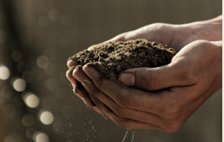Farming Methods That Thrive in a Decarbonized World
Speaker and Presenter Information
Peter Byck is a professor of practice at Arizona State University, in both the School of Sustainability and the Cronkite School of Journalism. He is the director, producer and writer of Carbon Nation. Byck is currently in production for Carbon Nation 2.0 - an on-going series of short films produced in collaboration with ASU. He is also working with scientists and ranchers on soil health & soil carbon storage research via regenerative grazing - the focus of the film Soil Carbon Cowboys, and many more short films: www.soilcarboncowboys.com.
Byck’s public speaking engagements highlight his most unique discovery during the 10 years since starting carbon nation: liberals and conservatives in the U.S. are not polarized, as the popular press presents. And in the realm of energy and soil health, he’s realized that if the subject of climate change is tabled, there is vast agreement on how the country should approach our use of energy and agriculture: people are chomping at the bit for clean energy, energy efficiency, smart land use & healthy food. A large portion of Americans are willing to make sacrifices to get us to a low carbon economy – they’re just waiting for someone to lead. And, regarding soil health, people trust nature - no matter their political affiliation.
Debbie Reed has been selected to guide the new ESM Consortium as its Executive Director. Debbie has been working on this project and its activities since its inception. She has focused on GHG mitigation and ecosystem services from the agricultural sector since 1997, having worked at the White House Council on Environmental Quality as the Director of Legislative Affairs and Agricultural Policy; and in the U.S. Senate as a Senior Staff on natural resource and agricultural issues for U.S. Senator Robert Kerrey of Nebraska. Prior to that she held numerous leadership positions at the U.S. Department of Agriculture, including special assistant to the Deputy Under Secretary for Research, Education and Economics (REE), and special assistant to the Administrator of the Agricultural Research Service (ARS). Her work at USDA included serving on multiple bi-national commissions on agricultural science and technology; and as the USDA Executive Secretariat for the US Dietary Guidelines for Americans. She has graduate and undergraduate degrees in human nutrition/dietetics, chemistry, and communications.
J. Rene Villalobos is an associate professor in the School of Computing, Informatics, and Decision Systems Engineering at Arizona State University. His research interests are in the areas of logistics, automated quality systems, manufacturing systems and applied operations research. Sponsors of Villalobos research include the National Science Foundation, Texas Advanced Technology Program, the Arizona Dept. of Transportation, U.S. Army and private industry.
Dorn Cox is a founding member of the Farm Hack community, the executive director for GreenStart, and a farmer working a 250-acre a multigenerational family farm with my wife, Sarah, and two boys. My participatory research focuses on collaborative open source research and development for regenerative agricultural systems.
I am a co-founder of the FarmOS software platform and have developed and shared systems for small-scale grain and oil seeds processing, biofuel production, and no-till and low-till equipment and cover crop systems to increase carbon capture and soil health.
I am also a founding member of the New England Farmers Union, the Great Bay Grain Cooperative, and the Oyster River Biofuel Initiative. I am an active member of Soil Renaissance as a member of the Measurement Committee. I serve as a county supervisor and vice-chair of the Strafford County Conservation District. Currently, I am vice president of the New Hampshire Association of Conservation Districts. I have a Bachelor of Science degree from Cornell University and a PhD from the University of New Hampshire in Natural Resources and Earth Systems Science.
Relevant Government Agencies
Dept of Agriculture, Dept of Commerce, Dept of Energy, State Government, City Government, Municipal Government, Federal Government, State & Local Government
Event Type
Webcast
This event has no exhibitor/sponsor opportunities
When
Wed, Oct 30, 2019, 1:15pm - 2:45pm
ET
Cost
Complimentary: $ 0.00
Website
Click here to visit event website
Organizer
SSF






